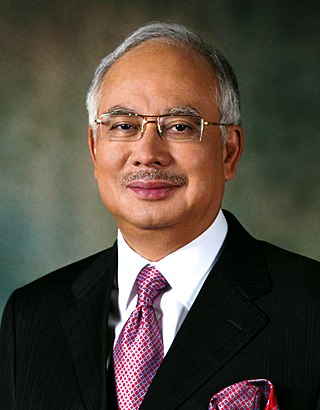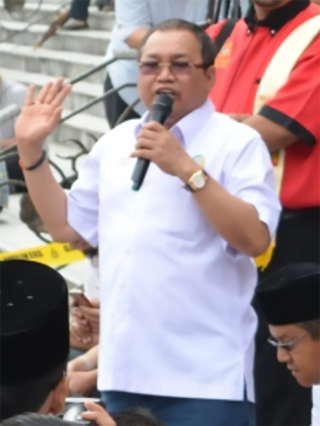
The economy of Malaysia is the fifth largest in Southeast Asia and the 38th largest in the world in terms of GDP. The 2018 labour productivity of Malaysia was measured at Int$55,360 per worker, the third highest in ASEAN. The 2021 Global Competitiveness Report ranked Malaysian economy the 25th most competitive country economy in the world.
Bumiputera or Bumiputra is a term used in Malaysia to describe Malays, the Orang Asli of Peninsular Malaysia, and various indigenous peoples of East Malaysia. The term is sometimes controversial, and has similar usage in the Malay world, used similarly in Indonesia and Brunei.

The United Malays National Organisation ; abbreviated UMNO or less commonly PEKEMBAR, is a nationalist right-wing political party in Malaysia. As the oldest continuous national political party within Malaysia, UMNO has been known as Malaysia's "Grand Old Party".
The New Economic Policy (NEP) was a social re-engineering and affirmative action program formulated by the National Operations Council (NOC) in the aftermath of 13 May Incident in Malaysia. This policy was adopted in 1971 for a period of 20 years and it was succeeded by the National Development Policy (NDP) in 1991. This article looks into the historical context that gave rise to the formulation of this policy, its objectives and implementation methods as well as its impact on the Malaysian economy in general.

Dato' Sri Haji Mohammad Najib bin Tun Haji Abdul Razak is a Malaysian politician who served as the sixth Prime Minister of Malaysia from 2009 to 2018. In 2020, he was convicted of corruption in the 1Malaysia Development Berhad scandal, one of the largest money-laundering and embezzlement scandals in history. He is the son of former prime minister Abdul Razak Hussein. Najib Razak was the chairman of the Barisan Nasional (BN) coalition from April 2009 to May 2018 and the president of the United Malays National Organisation (UMNO) from November 2008 to May 2018, which had maintained control of Malaysia's government with a parliamentary majority for more than sixty years until the coalition's defeat in the 2018 general election.

Wawasan 2020 or Vision 2020 is a Malaysian ideal introduced by the fourth and seventh Prime Minister of Malaysia, Mahathir Mohamad during the tabling of the Sixth Malaysia Plan in 1991. The vision calls for the nation to achieve a self-sufficient industrialised nation by the year 2020, encompasses all aspects of life, from economic prosperity, social well-being, educational worldclass, political stability, as well as psychological balance. To achieve Vision 2020, Mahathir lamented that the nation required an annual growth of 7% over the thirty-year period 1990–2020, so that the economy would be eightfold stronger than its 1990 GDP of RM115 billion. This would translate to a GDP of RM920 billion in 2020. Under Vision 2020 from 1991 to 2020, there are 3 sub 10 year development policy namely National development Policy 1991-2000 with OPP2, National Vision Policy 2001-2010 with OPP3 and New Economic Model 2011-2020 with National Transformation Programme NTP.

Khazanah Nasional Berhad (lit. 'National Treasure Limited'; doing business as Khazanah Nasional or simply Khazanah) is the sovereign wealth fund of the Government of Malaysia. One of the largest sovereign wealth funds in the world, it was established to invest surplus revenues for Malaysia. Through its investments and activities, the fund seeks to deliver sustainable economic and societal benefit for the nation. This includes achieving long-term risk-adjusted returns across the portfolio, as well as undertaking investments that catalyse new growth areas, strengthen Malaysia’s economic competitiveness, and contribute to priority socioeconomic outcomes.
Ketuanan Melayu is a political concept that emphasises Malay preeminence in present-day Malaysia. The Malays of Malaysia have claimed a special position and special rights owing to their longer history in the area and the fact that the present Malaysian state itself evolved from a Malay polity. The oldest political institution in Malaysia is the system of Malay rulers of the nine Malay states. The British colonial authorities transformed the system and turned it first into a system of indirect rule, then in 1948, using this culturally based institution, they incorporated the Malay monarchy into the blueprints for the independent Federation of Malaya.

Tan Sri Dato' Haji Mahiaddin bin Md. Yasin, commonly known as Muhyiddin bin Mohd. Yassin, is a Malaysian politician who served as the eighth Prime Minister of Malaysia from 2020 to 2021. Appointed as prime minister amid a political crisis, Muhyiddin served for 17 months and resigned after losing parliamentary support.
Shaariibuugiin Altantuyaa, a Mongolian national, was a murder victim who was either murdered by PETN and RDX explosives or was somehow killed first and her remains destroyed with explosives on 18 October 2006 in a deserted area in Shah Alam, Malaysia. Her murder case is significant in contemporary Malaysian politics due to the alleged involvement of persons close to the former Malaysian Prime Minister, Najib Razak.

General elections were held in Malaysia on Sunday, 5 May 2013. Voting took place in all 222 parliamentary constituencies, each electing one MP to the Dewan Rakyat, the dominant house of Parliament. State elections also took place in 505 state constituencies in 12 of the 13 states on the same day. The elections were the first since Najib Razak became Prime Minister in 2009.
1Malaysia was a political slogan coined by Malaysian former Prime Minister Najib Razak in 2009, with the stated goal of promoting ethnic harmony, national unity, and efficient governance. However, it quickly became embroiled in controversy.

The Najib Government was the federal executive government of Malaysia led by the Prime Minister, Najib Razak. The government was made up of members of the Barisan Nasional. Following the resignation of incumbent Prime Minister, Abdullah Ahmad Badawi, Najib sworn in to become the sixth Prime Minister of Malaysia on 3 April 2009. Najib announced his inaugural Cabinet on 9 April 2009. after Barisan Nasional's victory in the 2013 Malaysian general election, Najib resumed his leadership as prime minister and was sworn in on 7 May 2013 for a second term. His premiership ended after defeated of Barisan Nasional in 2018 Malaysian general election. After that he faces dozens of charges over his involvement in the 1Malaysia Development Berhad scandal.

Ahmad Husni bin Mohamad Hanadzlah is a former Second Minister of Finance of Malaysia. He was appointed on 10 April 2009 when Najib Razak became Prime Minister. He was also the Member of Parliament for Tambun for five terms from April 1995 to May 2018. He is a member of the United Malays National Organisation (UMNO), a major component party in the Barisan Nasional (BN) coalition.

Dato' Dr. Ibrahim bin Ali is a Malaysian politician. He is informally known as Tok Him. He served as the Member of Parliament (MP) for Pasir Mas from August 1986 to April 1995 and again from March 2008 to May 2013. He is a member of the Parti Bumiputera Perkasa Malaysia (PUTRA), a component party of the Gerakan Tanah Air (GTA) opposition coalition. He has served as the 1st and founding President of PUTRA since May 2019. He is also founding President of the Malay dominance organisation Pertubuhan Pribumi Perkasa (PERKASA).

The economic policy of the Najib Razak government marked a shift away from the state-oriented economic programmes of previous Malaysian governments. Najib Razak's government introduced various policies to liberalise the economy during his premiership from 2009 to 2018. This included a New Economic Model, subsidy reforms, international free trade agreements and stimulus packages. However, in the later stages of his administration, Malaysia experienced an economic downturn and a depreciation of the Malaysian Ringgit due to the 1Malaysia Development Berhad scandal (1MDB).

Pertubuhan Pribumi Perkasa, is a Malay supremacist non-governmental organisation (NGO) that was formed by Ibrahim Ali in the aftermath of the 2008 general election (GE12). This conservative, extreme-right, ethnic Malay organisation is led by its president Ibrahim Ali to influence the unity of Malaysian by refusing to accept any decoration of other ethnic group except Malay decoration. The group is reported to have a membership of 700,000.
Tan Sri Mohamed Nazir bin Tun Abdul Razak is a Malaysian banking executive. He was Chairman of CIMB Group, which is one of the largest financial services providers in Malaysia and ASEAN. He served as CEO of the group from 1999 to 2014. Nazir is the youngest son of the second Prime Minister of Malaysia Abdul Razak Hussein and brother of the sixth Prime Minister, Najib Razak.
Sanisvara Nethaji Rayer s/o Rajaji Rayer is a Malaysian politician and lawyer who has served as the Member of Parliament (MP) for Jelutong since May 2018. He served as Member of the Penang State Legislative Assembly (MLA) for Seri Delima from March 2008 to May 2018. He is a member of the Democratic Action Party (DAP), a component party of the Pakatan Harapan (PH) and formerly Pakatan Rakyat (PR) coalitions.
This is a list of events in the year 2019 in Malaysia.












